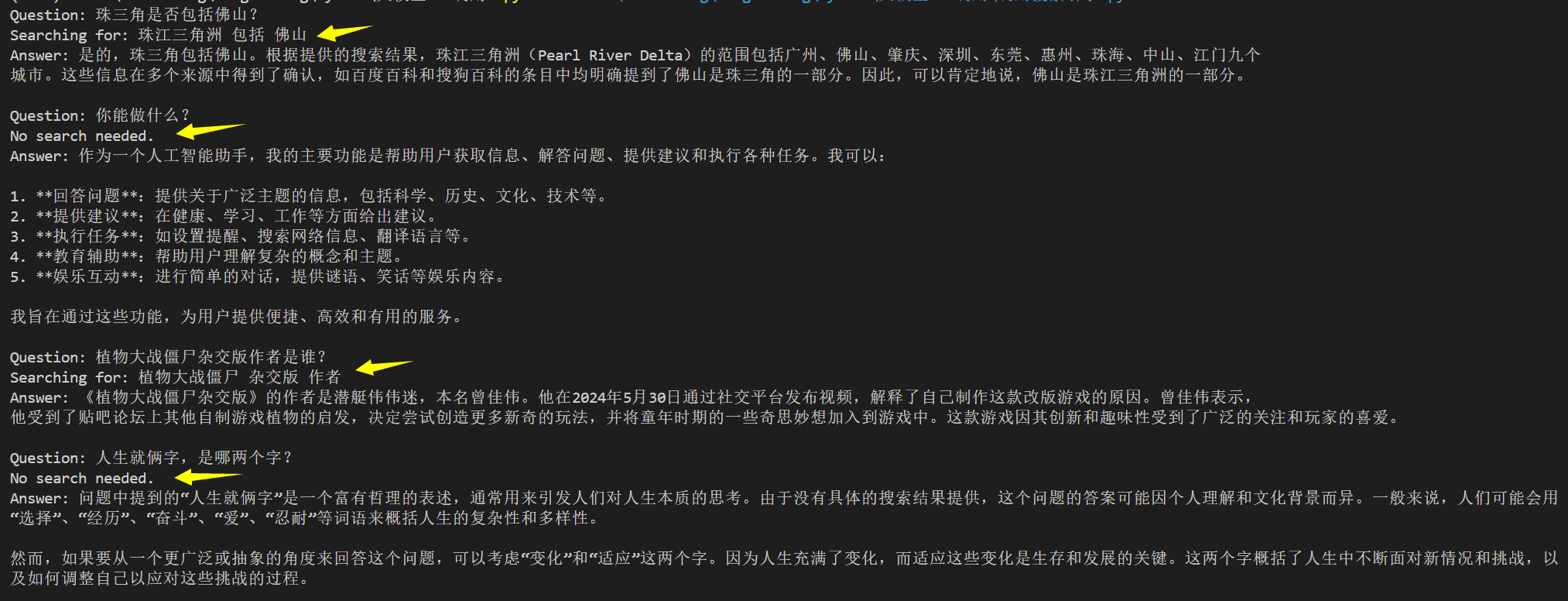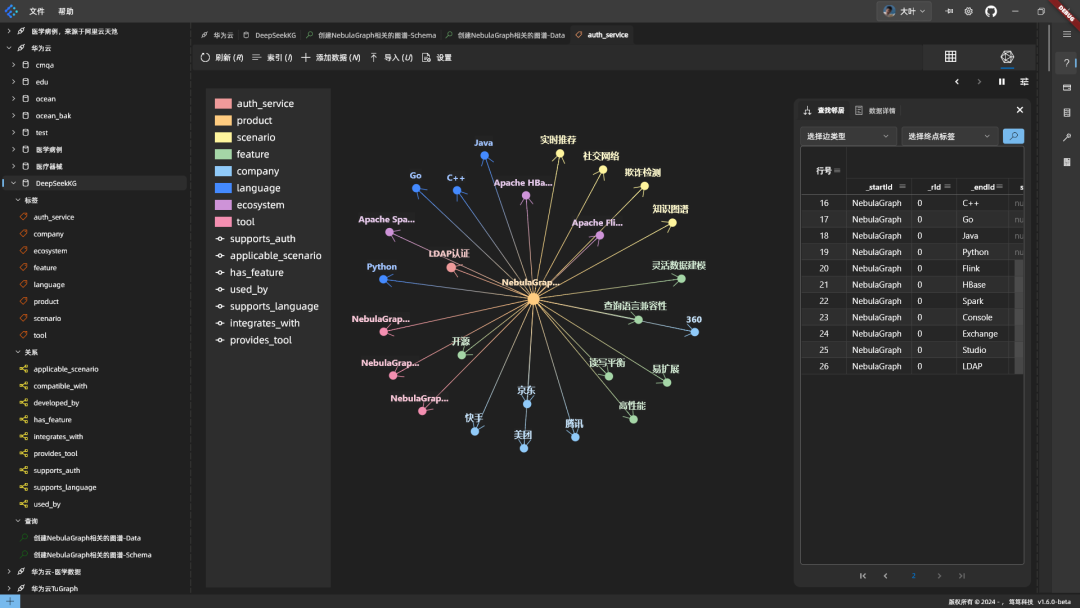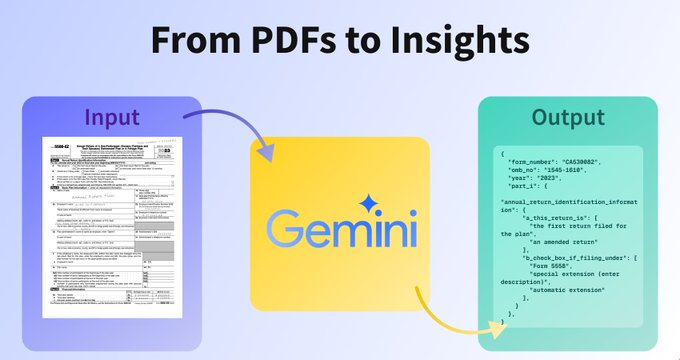Use DuckDuckGo's search API to give big models free access to networking functionality to achieve a New Bing-like effect.
Project Overview
By integrating DuckDuckGo Search APIs to give common large language models similar to the New Bing of real-time web access and intelligent Q&A capabilities. Multiplexing large models of existing Function callingFunctions for efficient and flexible query processing and answer generation process.
Core Realization
The system utilizes the Function calling mechanism for seamless integration of query processing and answer generation:
- Query analysis and search: using
claude-3-haikumaybegpt-3.5-turboThe simpler model generates optimized search terms and calls the search API through function calling. - Web Search: Call DuckDuckGo API to perform real-time information retrieval.
- Intelligent answer generation: using
claude-3-5-sonnnetmaybegpt-4oMore complex models such as these combine search results and original questions to generate accurate and comprehensive answers.
code implementation
1. Environmental settings and function definitions
import os
import json
from openai import OpenAI
from duckduckgo_search import DDGS
API_KEY = os.getenv("OPENAI_API_KEY")
BASE_URL = os.getenv("OPENAI_BASE_URL")
client = OpenAI(api_key=API_KEY, base_url=BASE_URL)
FUNCTIONS = [
{
"name": "search_duckduckgo",
"description": "使用DuckDuckGo搜索引擎查询信息。可以搜索最新新闻、文章、博客等内容。",
"parameters": {
"type": "object",
"properties": {
"keywords": {
"type": "array",
"items": {"type": "string"},
"description": "搜索的关键词列表。例如:['Python', '机器学习', '最新进展']。"
}
},
"required": ["keywords"]
}
}
]
2. Related auxiliary functions
def search_duckduckgo(keywords):
search_term = " ".join(keywords)
with DDGS() as ddgs:
return list(ddgs.text(keywords=search_term, region="cn-zh", safesearch="on", max_results=5))
def print_search_results(results):
for result in results:
print(
f"标题: {result['title']}\n链接: {result['href']}\n摘要: {result['body']}\n---")
def get_openai_response(messages, model="gpt-3.5-turbo", functions=None, function_call=None):
try:
response = client.chat.completions.create(
model=model,
messages=messages,
functions=functions,
function_call=function_call
)
return response.choices[0].message
except Exception as e:
print(f"调用OpenAI API时出错: {str(e)}")
return None
def process_function_call(response_message):
function_name = response_message.function_call.name
function_args = json.loads(response_message.function_call.arguments)
print(f"\n模型选择调用函数: {function_name}")
if function_name == "search_duckduckgo":
keywords = function_args.get('keywords', [])
if not keywords:
print("错误:模型没有提供搜索关键词")
return None
print(f"关键词: {', '.join(keywords)}")
function_response = search_duckduckgo(keywords)
print("\nDuckDuckGo搜索返回结果:")
print_search_results(function_response)
return function_response
else:
print(f"未知的函数名称: {function_name}")
return None
3. Main processing functions
def main(question):
print(f"问题:{question}")
messages = [{"role": "user", "content": question}]
response_message = get_openai_response(
messages, functions=FUNCTIONS, function_call="auto")
if not response_message:
return
if response_message.function_call:
function_response = process_function_call(response_message)
if function_response:
messages.extend([
response_message.model_dump(),
{
"role": "function",
"name": response_message.function_call.name,
"content": json.dumps(function_response, ensure_ascii=False)
}
])
final_response = get_openai_response(messages, model="gpt-4o")
if final_response:
print("\n最终回答:")
print(final_response.content)
else:
print("\n模型直接回答:")
print(response_message.content)
Realization effects
In this way, large models can be made capable of answering a variety of questions, such as:
- Geographic information: "Does the PRD include Foshan?"
- Questions about the AI's own capabilities, "What can you do?"
- Domain-specific question, "Who is the author of Plants vs. Zombies Hybrid?"
- Philosophical Musing: "Life is two words, which two words are they?"
- Current events related to "What is Jumping Inequality?"
- Time-related questions: "What is the current Beijing time?

Full Code
import os
import json
from openai import OpenAI
from duckduckgo_search import DDGS
API_KEY = os.getenv("OPENAI_API_KEY")
BASE_URL = os.getenv("OPENAI_BASE_URL")
client = OpenAI(api_key=API_KEY, base_url=BASE_URL)
FUNCTIONS = [
{
"name": "search_duckduckgo",
"description": "使用DuckDuckGo搜索引擎查询信息。可以搜索最新新闻、文章、博客等内容。",
"parameters": {
"type": "object",
"properties": {
"keywords": {
"type": "array",
"items": {"type": "string"},
"description": "搜索的关键词列表。例如:['Python', '机器学习', '最新进展']。"
}
},
"required": ["keywords"]
}
}
]
def search_duckduckgo(keywords):
search_term = " ".join(keywords)
with DDGS() as ddgs:
return list(ddgs.text(keywords=search_term, region="cn-zh", safesearch="on", max_results=5))
def print_search_results(results):
for result in results:
print(
f"标题: {result['title']}\n链接: {result['href']}\n摘要: {result['body']}\n---")
def get_openai_response(messages, model="gpt-3.5-turbo", functions=None, function_call=None):
try:
response = client.chat.completions.create(
model=model,
messages=messages,
functions=functions,
function_call=function_call
)
return response.choices[0].message
except Exception as e:
print(f"调用OpenAI API时出错: {str(e)}")
return None
def process_function_call(response_message):
function_name = response_message.function_call.name
function_args = json.loads(response_message.function_call.arguments)
print(f"\n模型选择调用函数: {function_name}")
if function_name == "search_duckduckgo":
keywords = function_args.get('keywords', [])
if not keywords:
print("错误:模型没有提供搜索关键词")
return None
print(f"关键词: {', '.join(keywords)}")
function_response = search_duckduckgo(keywords)
print("\nDuckDuckGo搜索返回结果:")
print_search_results(function_response)
return function_response
else:
print(f"未知的函数名称: {function_name}")
return None
def main(question):
print(f"问题:{question}")
messages = [{"role": "user", "content": question}]
response_message = get_openai_response(
messages, functions=FUNCTIONS, function_call="auto")
if not response_message:
return
if response_message.function_call:
if not response_message.content:
response_message.content = ""
function_response = process_function_call(response_message)
if function_response:
messages.extend([
response_message.model_dump(),
{
"role": "function",
"name": response_message.function_call.name,
"content": json.dumps(function_response, ensure_ascii=False)
}
])
final_response = get_openai_response(messages, model="gpt-4o")
if final_response:
print("\n最终回答:")
print(final_response.content)
else:
print("\n模型直接回答:")
print(response_message.content)
if __name__ == "__main__":
main("植物大战僵尸杂交版的作者是谁?他是怎么想到做出来这个游戏的?")
© Copyright notes
Article copyright AI Sharing Circle All, please do not reproduce without permission.
Related posts

No comments...




